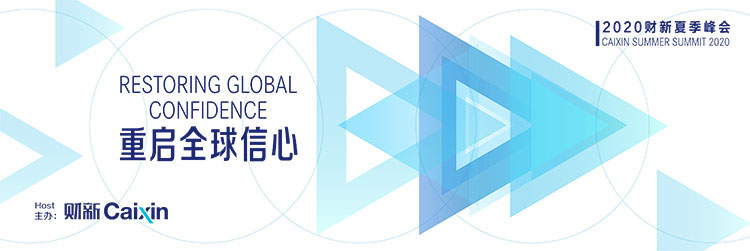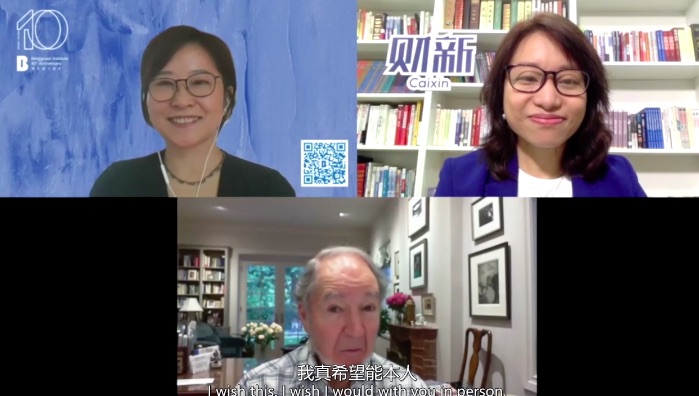China's Opening Up in an Age of Uncertainty
The pandemic has seriously affected the world economy and greatly impacted transnational investment and business. Faced with unprecedented challenges, what adjustments does China need to make? How might the new “dual circulation” policy and refocusing of economic development on people's livelihoods shape China’s future growth? Can China maintain or even accelerate its opening-up policies and integration with the global economy?
No one knows better than Shenzhen. The city has significantly relaxed market access restrictions and cut red tape for businesses, helping build one of the world’s most advanced tech supply chains. Can Shenzhen lead China to further reform and opening up, and continue serving as a model for the country?
Caixin will co-host an online forum “China's Opening Up in an Age of Uncertainty” with the Shenzhen Foundation For International Exchange and Cooperation (SFIEC). Speakers from China, U.S., Singapore and Europe, will share insights from their careers in academia, government, and the financial industry on how they see China’s next chapter of opening-up in an age of great uncertainties.
Time
Thursday September 10
Beijing Time 8:00 p.m.-9:00 p.m./ EST 8:00 a.m.-9:00 a.m./CET 2:00 p.m.-3:00 p.m.
Topics
- What is the new way out for the Chinese economy? What is the significance of opening up amid rising anti-globalization sentiment?
- What are the challenges China faces in further opening-up, and the corresponding solutions?
- How can China achieve the "dual circulation”?
- What advantages does Shenzhen have in terms of optimizing foreign investment and providing service management?
- What are the new opportunities for foreign investment in the Greater Bay Area and the Demonstration Pilot Zone?
Speakers
• Kishore Mahbubani, Distinguished Fellow at the Asia Research Institute (ARI), National University of Singapore (NUS); Former Singapore's Permanent Representative to the United Nations
• Tao Yitao, Director of the China Centre of SEZ Research, Shenzhen University; Vice Chairman, Shenzhen Foundation For International Exchange and Cooperation (SFIEC)
• Jeffrey Schott, Senior Fellow, International Trade Policy and Economic Sanctions, the Peterson Institute for International Economics
• Alicia García-Herrero, Chief Economist for Asia-Pacific, Natixis; Senior Research Fellow, Bruegel
Moderator:
Li Xin, Vice President, Caixin Media; Managing Director, Caixin Global
Speakers Bio
 |
Kishore Mahbubani |
Distinguished Fellow at the Asia Research Institute (ARI), National University of Singapore (NUS)
Former Singapore's Permanent Representative to the United Nations
Kishore Mahbubani is a Distinguished Fellow at ARI for a period of three years effective 1 July 2019. He was with the Singapore Foreign Service for 33 years (1971-2004), where he served twice as Singapore’s Ambassador to the United Nations and as Permanent Secretary of the Foreign Ministry from 1993-1998. He was also the Founding Dean of the Lee Kuan Yew School of Public Policy from 2004-2017.
He is a member of the American Academy of Arts and Sciences and he is the author of many books, including ‘Can Asians Think?’. His research interests are in the resurgence of Asia, ASEAN, public policies in Singapore, global geo-politics and global governance.
 |
Tao Yitao |
Director of the China Centre of SEZ Research, Shenzhen University
Vice Chairman, Shenzhen Foundation For International Exchange and Cooperation (SFIEC)
Tao Yitao is a professor in economics and a noted expert in Special Economic Zone (SEZ) research. She obtained her doctorate in economics from the Shanghai University of Finance & Economics in 1989 under the famous scholar Professor Hu Jichuang.
She is an expert in economic history, the history of economic theory and institutional economics. Her research in the last 20 years has focused on the history of China’s Reform and Opening-Up (CROU), the developmental history of China’s SEZs, comparative study between Chinese and foreign SEZs and free-trade zones and comparative Bay Area research, all with considerable academic impact in China and abroad.
Tao Yitao has done planning and consultancy work regarding SEZ and FTZ projects on behalf of Vietnam, the African Development Bank, the UN Development Programme, the Russian Far East, South Africa, Rwanda, Papua New Guinea, Cambodia, India, Pakistan, Kazakhstan and others.
 |
Jeffrey Schott |
Senior Fellow, International Trade Policy and Economic Sanctions
the Peterson Institute for International Economics
Jeffrey J. Schott joined the Peterson Institute for International Economics in 1983 and is a senior fellow working on international trade policy and economic sanctions. During his tenure at the Institute, Schott was also a visiting lecturer at Princeton University (1994) and an adjunct professor at Georgetown University (1986–88). He was a senior associate at the Carnegie Endowment for International Peace (1982–83) and an official of the US Treasury Department (1974–82) in international trade and energy policy. During the Tokyo Round of multilateral trade negotiations, he was a member of the US delegation that negotiated the GATT Subsidies Code. He is a member of the State Department's Advisory Committee on International Economic Policy and previously cochaired the Trade and Environment Policy Advisory Committee for the US Trade Representative.
Schott is the author, coauthor, or editor of several books on trade, including Trans-Pacific Partnership: An Assessment (2016), Local Content Requirements: A Global Problem (2013), Understanding the Trans-Pacific Partnership (2012), etc.
Schott holds a BA degree magna cum laude from Washington University, St. Louis (1971), and an MA degree with distinction in international relations from the School of Advanced International Studies of Johns Hopkins University (1973).
 |
Alicia García-Herrero |
Chief Economist for Asia-Pacific, Natixis;
Senior Research Fellow, Bruegel;
Adjunct Professor, HKUST Business School
Alicia is a Senior Fellow at European think-tank Bruegel. She is also the Chief Economist for Asia Pacific at Natixis and non-resident Research Fellow at Madrid-based political think tank Real Instituto Elcano. She is currently Adjunct Professor at the HKUST Business School and member of the advisory board of Berlin-based China think-tank MERICS. Finally, Alicia is advisor to the Hong Kong Monetary Authority’s research arm (HKIMR) and the Asian Development Bank (ADB) as well as a member of the board of the Hong Kong Forum and co-founder of Bright Hong Kong.
In previous years, Alicia held the following positions: Chief Economist for Emerging Markets at Banco Bilbao Vizcaya Argentaria (BBVA), Member of the Asian Research Program at the Bank of International Settlements (BIS), Head of the International Economy Division of the Bank of Spain, Member of the Counsel to the Executive Board of the European Central Bank, Head of Emerging Economies at the Research Department at Banco Santander, and Economist at the International Monetary Fund. In addition, Alicia has always combined her professional career with academia, having served as visiting Professor for John Hopkins University, China Europe International Business School (CEIBS) in Shanghai and Carlos III University in Madrid.
Alicia holds a PhD in Economics from George Washington University and has published extensively in refereed journals and books.
- GALLERY
- PODCAST










